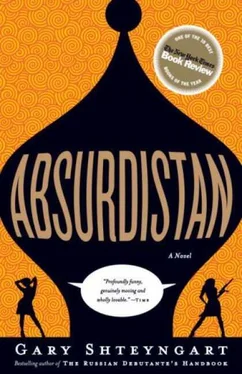Children? Was he talking about us ? What would an Ice Cube or an Ice-T do in this situation? I reached for my mobilnik, ready to dial my Park Avenue analyst, Dr. Levine, to tell him that once again I had been insulted and injured, that once again I had been undermined by a fellow Russian.
And then I heard my manservant, Timofey, ringing his special hand bell. The mobilnik fell out of my hand, the Pushkin lover and his girlfriend disappeared from the pontoon, the pontoon itself floated off into another dimension, even Dr. Levine and his soft American ministrations were reduced to a distant hum.
It was feeding time.
With a low bow, manservant Timofey presented me with a tray of blackened sturgeon kebabs and a carafe of Black Label. I fell down on a hard plastic chair that twisted and torqued beneath my weight like a piece of modern sculpture. I bent over the sturgeon, sniffing it with closed eyes as if offering a silent prayer. My feet were locked together, my ankles grinding into each other with expectant anxiety. I prepared for my meal in the usual fashion: fork in my left hand; my dominant right clenched into a fist on my lap, ready to punch anyone who dared take away my food.
I bit into the sturgeon kebab, filling my mouth with both the crisp burnt edges and the smooth mealy interior. My body trembled inside my leviathan Puma tracksuit, my heroic gut spinning counterclockwise, my two-scoop breasts slapping against each other. The usual food-inspired images presented themselves. Myself, my Beloved Papa, and my young mother in a hollowed-out boat built to resemble a white swan floating past a grotto, triumphant Stalin-era music echoing around us (“Here’s my passport! What a passport! It’s my great red Soviet passport!”), Beloved Papa’s wet hands rubbing my tummy and skirting the waistband of my shorts, and Mommy’s smooth, dry ones brushing against the nape of my neck, a chorus of their hoarse, tired voices saying, “We love you, Misha. We love you, bear cub.”
My body fell into a rocking motion like the religious people rock when they’re deep in the thrall of their god. I finished off the first kebab and the one after that, my chin oily with sturgeon juices, my breasts shivering as if they’d been smothered with packets of ice. Another chunk of fish fell into my mouth, this one well dusted with parsley and olive oil. I breathed in the smells of the sea, my right fist still clenched, fingers digging into palm, my nose touching the plate, sturgeon extract coating my nostrils, my little circumcised khui burning with the joy of release.
And then it was over. And then the kebabs were gone. I was left with an empty plate. I was left with nothing before me. Ah, dear me. Where was I now? An abandoned bear cub without his li’l fishy. I splashed a glass of water on my face and dabbed myself off with a napkin Timofey had tucked into my tracksuit. I picked up the carafe of Black Label, pressed it to my cold lips, and, with a single tilt of the wrist, emptied it into my gullet.
The world was golden around me, the evening sun setting light to a row of swaying alders; the alders abuzz with the warble of siskin birds, those striped yellow fellows from our nursery rhymes. I turned pastoral for a moment, my thoughts running to Beloved Papa, who was born in a village and for whom village life should be prescribed, as only there—half asleep in a cowshed, naked and ugly, but sober all the same—do the soft tremors of what could be happiness cross his swollen Aramaic face. I would have to bring him here one day, to the Home of the Russian Fisherman. I would buy him a few chilled bottles of his favorite Flagman vodka, take him out to the farthest pontoon, put my arm around his dandruff-dusted shoulders, press his tiny lemur head into one of my side hams, and make him understand that despite all the disappointments I have handed him over the past twenty years, the two of us are meant to be together forever.
Emerging from the food’s thrall, I noticed that the demographics of the Spawning Salmon pontoon were changing. A group of young coworkers in blue blazers had shown up, led by a buffoon in a bow tie who played the role of a “fun person,” breaking the coworkers up into teams, thrusting fishing rods into their weak hands, and leading them in a chorus of “Fi-ish! Fi-ish! Fi-ish!” What the hell was going on here? Was this the first sign of an emerging Russian middle class? Did all these idiots work for a German bank? Perhaps they were holders of American MBAs.
Meanwhile, all eyes fell on a striking older woman in a full-length white gown and black Mikimoto pearls, casting her line into the man-made lake. She was one of those mysteriously elegant women who appear to have walked in from the year 1913, as if all those red pioneer scarves and peasant blouses from our jackass Soviet days had never alighted on her delicate shoulders.
I am not enamored of such people, I must say. How is it possible to live outside of history? Who can claim immunity to it by dint of beauty and breeding? My only consolation was that neither this charming creature nor the young Deutsche Bank workers now shouting in unison “Sal-mon! Sal-mon!” would catch any tasty fish today. Beloved Papa and I have an agreement with the management of the Home of the Russian Fisherman restaurant—whenever a Vainberg takes up a rod, the owner’s nephew puts on his Aqua-Lung, swims under the pontoons, and hooks the best fish on our lines. So all Czarina with the Black Pearls would get for her troubles would be a tasteless, defective salmon.
You can’t ignore history altogether.
On the night in question, Alyosha-Bob and I were joined by three lovely females: Rouenna, the love of my life, visiting for two weeks from the Bronx, New York; Svetlana, Alyosha-Bob’s dark-eyed Tatar beauty, a junior public-relations executive for a local chain of perfume shops; and Beloved Papa’s twenty-one-year-old provincial wife, Lyuba.
I must say, I was anxious about bringing these women together (also, I have a generalized fear of women). Svetlana and Rouenna have aggressive personalities; Lyuba and Rouenna were once lower-class and lack refinement; and Svetlana and Lyuba, being Russian, present with symptoms of mild depression rooted in early childhood trauma (cf. Papadapolis, Spiro, “It’s My Pierogi: Transgenerational Conflict in Post-Soviet Families,” Annals of Post-Lacanian Psychiatry, Boulder/Paris, Vol. 23, No. 8, 1997). A part of me expected discord among the women, or what the Americans call “fireworks.” Another part of me just wanted to see that snobby bitch Svetlana get her ass kicked.
While Alyosha-Bob and I were rapping, Lyuba’s servant girl had been making the girls pretty with lipstick and pomade in one of the Fisherman’s changing huts, and when they joined us on the pontoon, they reeked of fake citrus (and a touch of real sweat), their dainty lips aglow in the summer twilight, their teeny voices abuzz with interesting conversation about Stockmann, the celebrated Finnish emporium on St. Leninsburg’s main thoroughfare, Nevsky Prospekt. They were discussing a summer special—two hand-fluffed Finnish towels for US$20—both towels distinguished by their highly un-Russian, shockingly Western color: orange.
Listening to the tale of the orange towel, I got a little engorged down in the circumcised purple half- khui department. These women of ours were so cute! Well, not my stepmother, Lyuba, obviously, who is eleven years younger than me and happens to spend her nights moaning unconvincingly under the coniferous trunk of Beloved Papa, with his impressive turtlelike khui (blessed memories of it swinging about in the bathtub, my curious toddler hands trying to snatch it).
And I wasn’t hot for Svetlana, either; despite her fashionable Mongol cheekbones, her clingy Italian sweater, and that profoundly calculated aloofness, the supposedly sexy posturing of the educated Russian woman, despite all that, let me tell you, I absolutely refuse to sleep with one of my co-nationals. God only knows where they’ve been.
Читать дальше












